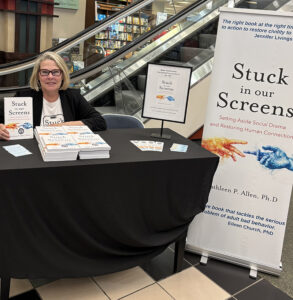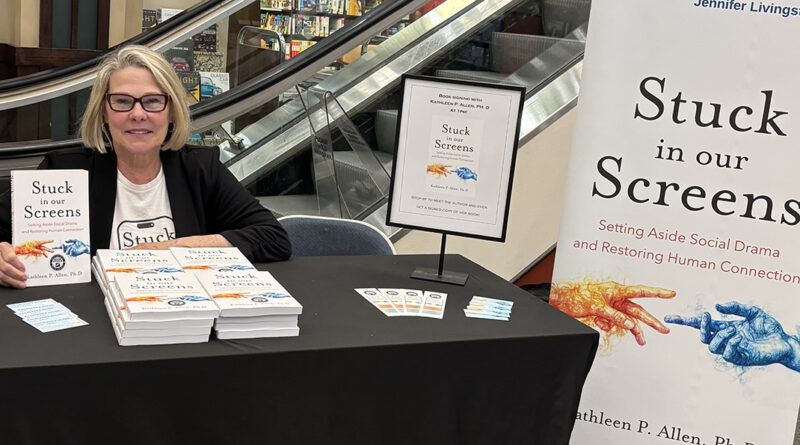LAST PAGE: Kathleen Allen
First book of Rochester author delves into bad adult behavior, social media impact on society
By Stefan Yablonski

Q: Why this topic of your book, “Stuck in Our Screens: Setting Aside Social Drama and Restoring Human Connection”?
A: I wrote this to shine the light on bad adult behavior. I’d wanted to write a book for parents and teachers to help them understand adolescent social drama so they could support kids in sorting themselves out as they grew up. But it just didn’t seem fair to criticize youth when grownups were behaving far worse than just about any teen. I decided I needed to write about what adult social drama was doing to us from a society-wide perspective. It became something quite different. Adults ought to have their act together and not behave in such an immature and ridiculous way. Social media and the internet contribute to that.
Q: What’s social drama?
A: It’s an interaction or set of interactions that involve two or more people characterized by excessive emotionality and overreaction, about something that is trivial, inconsequential or of inflated importance, that often involves more people than is necessary. It’s prolonged until something more interesting comes along. At which point, that drama ceases to have much juice and it’s dropped or replaced by something else more exciting. It’s like a big black magnetic hole that sucks people in and wreaks havoc with their lives.
Q: It’s a big problem?
A: When youth or immature adults are involved in drama it adds a lot of chaos and conflict to life. People who do drama are high maintenance and difficult. They put a lot of strain on relationships. They suck us dry. They drain our emotions and our stamina. When social drama includes manipulation, deceit, dishonesty or other negative qualities or behaviors they can turn our moral and psychological lives upside down.
We’ve turned ourselves into entertainment that we put out there so we get attention from people — get to feel and act like celebrities.
We worry about kids — but I think we really need to worry about adults as well. The emphasis on hype and the extremes has increased our polarization in our country. It’s made people susceptible to conspiracy theories. It has pitted us against each other. We need to get out of the screens and drop the drama. We need to be honest. We need to resurrect social and civic engagement; that happens offline in face-to-face settings.
Q: What else can can we do?
A: There’re a number of things we can do to at least put the brakes on our descent into a less human world. I’d like to see fewer screens in people’s hands and no screens in children’s hands. I’m all in favor of a childhood without a smart phone. I’d like to see people reading, talking or at least observing the world they find themselves in instead of amusing themselves by scrolling through social media. The more time we spend in our screens the more our conversational skills atrophy.
People born in the 1990s essentially have never known a world without smart phones — they’re parents now. Their behavior models this incessant focus on screens. Adults must regulate their own behavior so they can influence their children’s behavior.
I think we’re disintegrating to be honest with you. We’re falling apart. The dehumanization that comes from too much screen time is part of the problem. We do way too much communication through screens. The sense of connection people get from websites is really a false sense of connection; it divides us. Our relationships are meant to be face-to-face.

